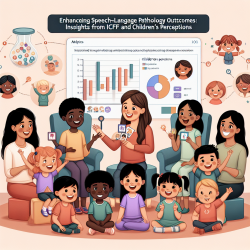Introduction
The landscape of neurodevelopmental disorder research is evolving, with a growing emphasis on utilizing diverse data sources to enrich our understanding and improve clinical outcomes. One such disorder, SLC6A1-related disorder, is gaining attention due to its complex phenotypic spectrum, which includes developmental delay, epilepsy, and autism spectrum traits. Recent research, such as the study titled "Consistency of parent-report SLC6A1 data in Simons Searchlight with Provider-Based Publications," highlights the potential of parent-reported data to complement traditional provider-reported datasets.
The Role of Parent-Reported Data
Parent-reported data, as collected through initiatives like the Simons Searchlight registry, offers a unique perspective on the clinical features of SLC6A1-related disorders. This approach not only broadens the data pool but also provides a more holistic view of the disorder's impact on daily life. The study in question compared parent-reported data with provider-reported data, revealing a high degree of consistency in key phenotypic features, such as developmental delay and autism spectrum disorder (ASD).
Key Findings and Implications
The study analyzed data from 116 provider-reported cases and 43 caregiver-reported cases. It found no significant differences in the prevalence of developmental delay, ASD, or ADHD between the two datasets. However, caregivers reported higher instances of hypotonia, while epilepsy was more frequently noted by providers. These findings underscore the value of incorporating parent-reported data into clinical research, particularly for rare disorders where traditional data collection may be limited.
Improving Clinical Trial Readiness
Standardized parent-report data collection methods, as demonstrated by the Simons Searchlight registry, are crucial for clinical trial readiness. They provide larger sample sizes and more comprehensive data than smaller published case series. This is particularly important for rare conditions like SLC6A1-related disorder, where logistical barriers can hinder patient enrollment in research studies.
Encouraging Further Research
Practitioners are encouraged to explore the integration of parent-reported data into their research methodologies. By doing so, they can enhance the robustness of their findings and contribute to a more nuanced understanding of neurodevelopmental disorders. Additionally, engaging with registries like Simons Searchlight can facilitate the collection of longitudinal data, which is vital for tracking the natural history of these disorders and evaluating the efficacy of emerging therapies.
Conclusion
The study "Consistency of parent-report SLC6A1 data in Simons Searchlight with Provider-Based Publications" demonstrates the potential of parent-reported data to complement traditional clinical data sources. By leveraging these insights, practitioners can improve their research outcomes and contribute to the development of more effective therapeutic interventions for SLC6A1-related disorders.
To read the original research paper, please follow this link: Consistency of parent-report SLC6A1 data in Simons Searchlight with Provider-Based Publications.










